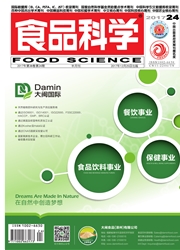

 中文摘要:
中文摘要:
为探索牛初乳中的重要活性物质胰岛素样生长因子(IGF-1)对胃肠黏膜免疫系统中细胞因子网络的调节作用,以家兔为研究对象,通过口服,腹腔注射,耳静脉注射三种IGF-1给药方式,三种给药方式分别在给药后3、2、2h取血,并用ELISA双抗体夹心法检测血清中IFN-γ、TNF-α、TGF—β1、IL1β、IL-10、IL一4、IL一6、L-1Ra的水平。结果表明:IGF-I经口服、腹腔注射、耳静脉注射三种途径给药后血清中发炎细胞因子IL-6、IL一1β、TNF-α、IFN-γ水平比给药前显著上升,抗炎细胞因子IL-1Ra、IL-4、IL-10及TGF.D1的水平比给药前显著下降。这说明,IGF-1进入肠腔后,作为外来抗原,经肠黏膜单层上皮细胞、树突状细胞和其他抗原呈递细胞进行抗原处理、加工和呈递,激活细胞内部的炎症信号。另外,未被胃肠道中的酶水解的IGF-1,则可能通过肠上皮细胞介导的胞吞作用穿过肠黏膜屏障,被巨噬细胞、单核细胞、肥大细胞以及NK细胞等先天免疫细胞所识别,促进发炎细胞因子的产生,抑制抗炎细胞因子的产生。
 英文摘要:
英文摘要:
The aim of this study was to explore and evaluate the effects of insulin-like growth factor-1 (IGF-1), an important bioactive material in bovine colostrum, on the production levels of IFN-γ、TNF-α、TGF-β1、IL1β、IL-10、IL一4、IL一6 and IL-1Ra in rabbit serum and to study the regulatory effects of IGF- 1 on the gastrointestinal mucosa immunity signaling. Rabbit serum was collected 3,2, and 2 h after oral administration, intrapedtoneal injection and ear intravenous injection with IGF- 1, respectively, to examine the contents of IL-6、IL一1β、TNF-α、IFN-γ, IL-10, IL-4, IL-6, and IL-1Ra by ELISA assay. The IGF-1 admints tration in the three ways all significantly increased the contents of inflammatory cytikines like IFN- γ, IL-6, IL-1, and TNF- a while the contents of anti-inflammatory cytokines like TGF- β 1, IL- 10, IL-4, and IL- 1Ra were significantly decreased. After entering the intestine, IGF-I as a foreign antigen is processed and presented by intestinal epithelial cells, dendritic cells and other antigen-presenting cells to activate intraceUular inflammatory signaling pathway. A part of IGF- 1 that is not digested in the gastrointestinal tract is likely to be absorbed by a polycation-sensitive, absorptive-mediated endocytosis and was identified by macrophages, monoeytes, mast cells, NK cells and other innate immune cells and thus induces the production of inflammatory cytokines and inhibit the production of anti-inflammatory cytokines.
 同期刊论文项目
同期刊论文项目
 同项目期刊论文
同项目期刊论文
 期刊信息
期刊信息
